Key takeaways:
- Building confidence involves self-awareness, recognizing strengths and weaknesses, and embracing constructive feedback for growth.
- Techniques such as positive affirmations, challenging negative thoughts, and visualization can significantly enhance self-confidence.
- Establishing supportive relationships, setting achievable goals, and reflecting on progress are crucial elements in the journey of confidence building.
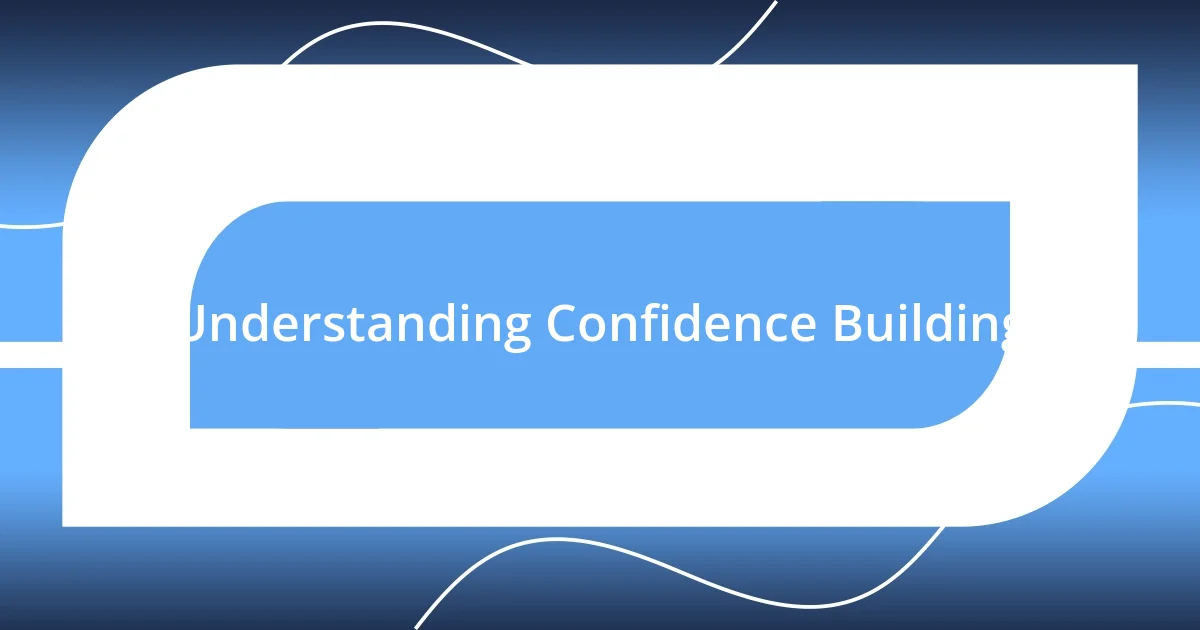
Understanding Confidence Building
Confidence building is a journey, not a destination. I remember the first time I stepped onto a stage to present in front of an audience. My heart raced, and I thought, “What if they don’t like what I have to say?” That feeling of vulnerability is universal; it connects us and underscores the importance of embracing our fears.
The foundation of confidence lies in self-awareness and understanding our abilities. I often ask myself, “What am I good at?” Focusing on my strengths, rather than dwelling on shortcomings, has transformed my approach. This shift in perspective doesn’t eliminate self-doubt but rather helps me manage it, reminding me that everyone has unique talents worth celebrating.
Building confidence also requires confronting the discomfort that comes with new experiences. When I joined a local improv group, I was terrified—but that fear quickly faded as I learned to embrace spontaneity. Have you ever faced a situation that pushed you out of your comfort zone? Each experience like this reinforces my belief that growth often happens on the edge of discomfort.
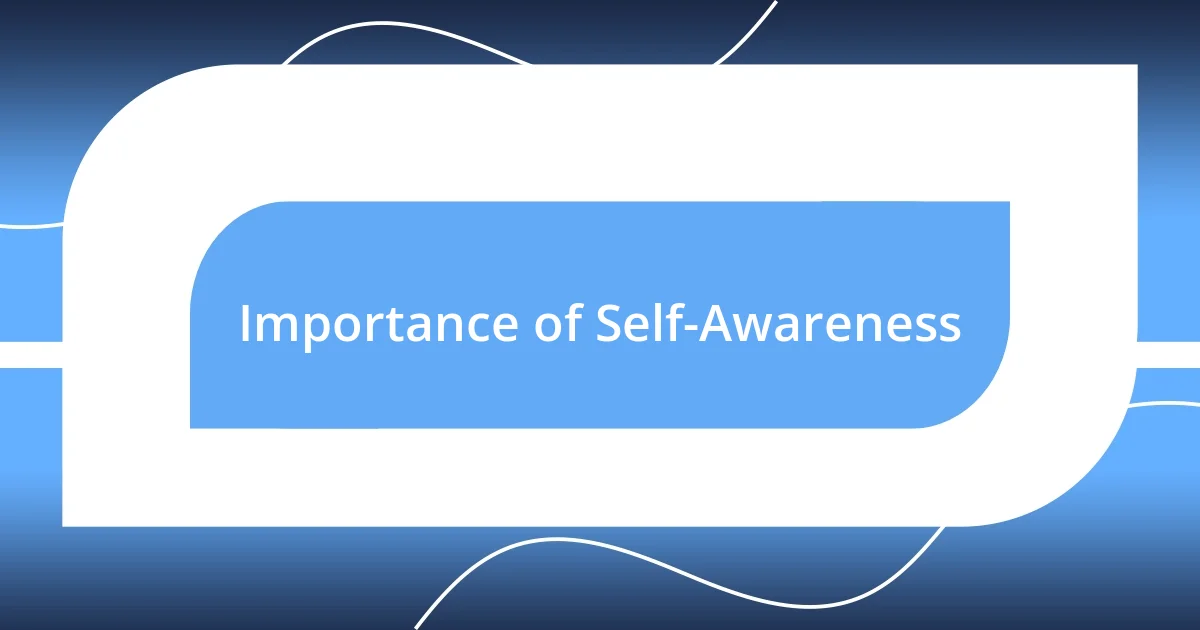
Importance of Self-Awareness
Self-awareness plays an essential role in building confidence. It allows us to recognize our strengths and weaknesses, which ultimately shapes our self-image. I remember a time when I received constructive feedback after a presentation. At first, it felt like a blow to my confidence, but reflecting on it helped me see areas for improvement. Embracing this perspective turned that feedback into a powerful tool for growth.
- Self-awareness fosters authenticity, enabling us to express ourselves more freely.
- It helps identify personal triggers that may lead to self-doubt.
- Being self-aware encourages a mindset of continuous improvement, rather than perfection.
- Understanding our values and passions can align our actions with what truly matters to us.
- It cultivates empathy, allowing us to connect better with others, which can boost our confidence in social situations.
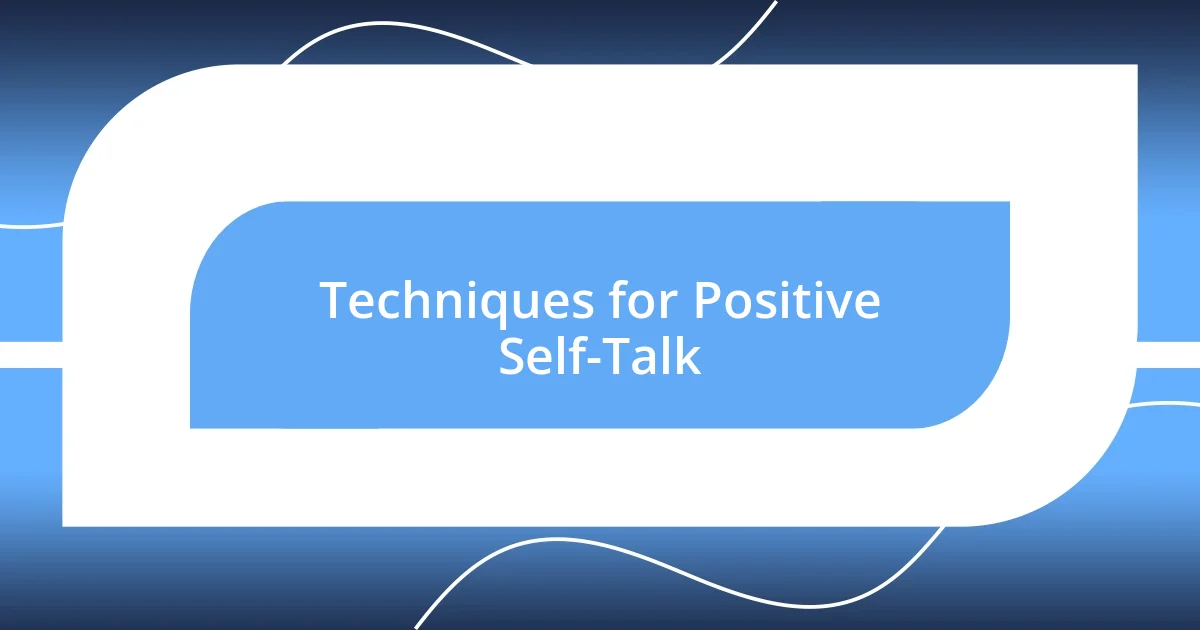
Techniques for Positive Self-Talk
Techniques for positive self-talk can serve as powerful instruments in boosting confidence. One technique I’ve found particularly effective is the practice of affirmations. These are simple, positive statements that reflect my goals or strengths. For instance, I often say, “I am capable of overcoming challenges.” This practice not only cultivates a positive mindset but also nudges me toward taking action when I might otherwise hesitate.
Another technique is to challenge negative thoughts, a skill I developed through reflection and journaling. Whenever self-doubt rears its head, I ask myself, “Is this thought constructive or simply fear talking?” I recall a time I feared failing a job interview. By writing down my thoughts, I discovered that many were unfounded. Recognizing this shifted my perspective, helping me embrace a more balanced view of myself.
Lastly, I find visualization incredibly effective. I often picture myself succeeding in scenarios that typically cause anxiety, like public speaking. This mental rehearsal creates familiarity and reduces nervousness. Have you ever visualized a successful outcome? It’s a game-changer, reinforcing my belief that I can rise to the occasion.
| Technique | Description |
|---|---|
| Affirmations | Positive statements that empower and motivate. |
| Challenge Negative Thoughts | Reflect on and question the validity of negative self-talk. |
| Visualization | Mental imagery to prepare for success in stressful situations. |
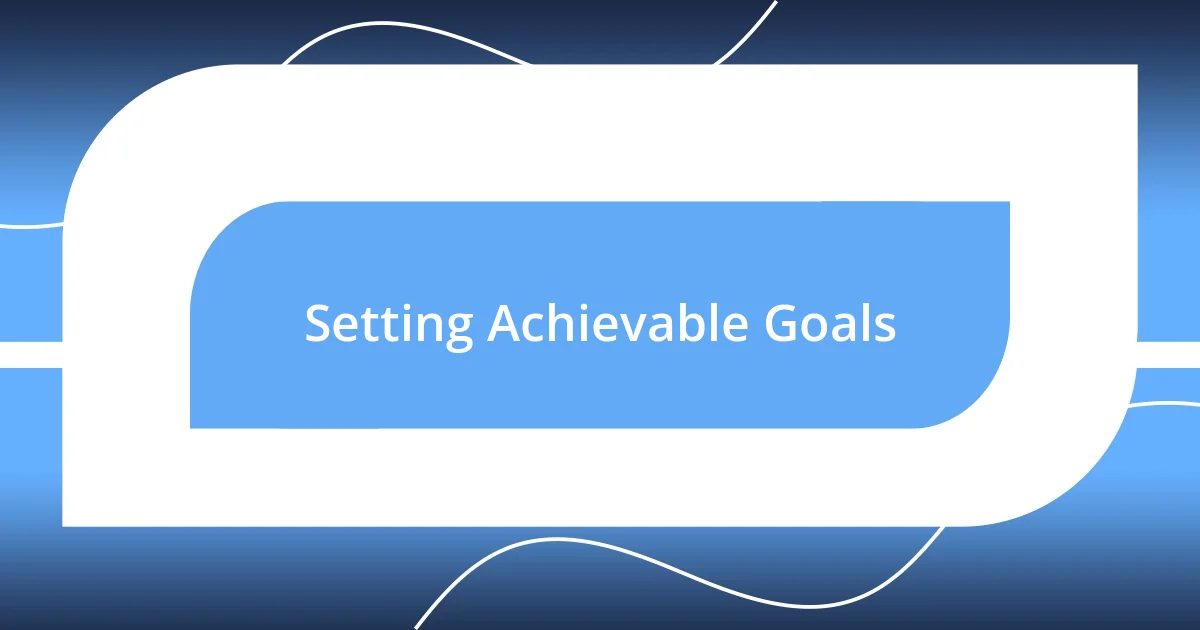
Setting Achievable Goals
Setting achievable goals is a crucial step in building confidence. I remember when I set my sights on running a 5K. At first, it felt overwhelming, but instead of diving straight into that distance, I broke it down. I started with short runs, gradually increasing my distance each week. Each little achievement along the way made me feel like I was moving closer to my target, illuminating my capability with every step.
What I find fascinating about goal-setting is how it connects to our self-image. Each time I completed a small goal, whether it was running a mile without stopping or just getting out the door to exercise, it reinforced my belief in myself. It’s like adding layers to a structure—each one strengthens the whole. Have you ever felt that rush of accomplishment from a small victory? Those moments remind us of our potential, enabling us to take on larger challenges with newfound confidence.
It’s essential to remember that these goals should be specific and realistic. When I aimed to learn a new skill, instead of saying, “I want to be good at painting,” I set a goal to complete one painting every month. This clarity in purpose kept me engaged and motivated. So, what goals are you considering? I encourage you to think about how you can make them realistic and measurable, turning each goal into a stepping stone toward greater self-assurance.
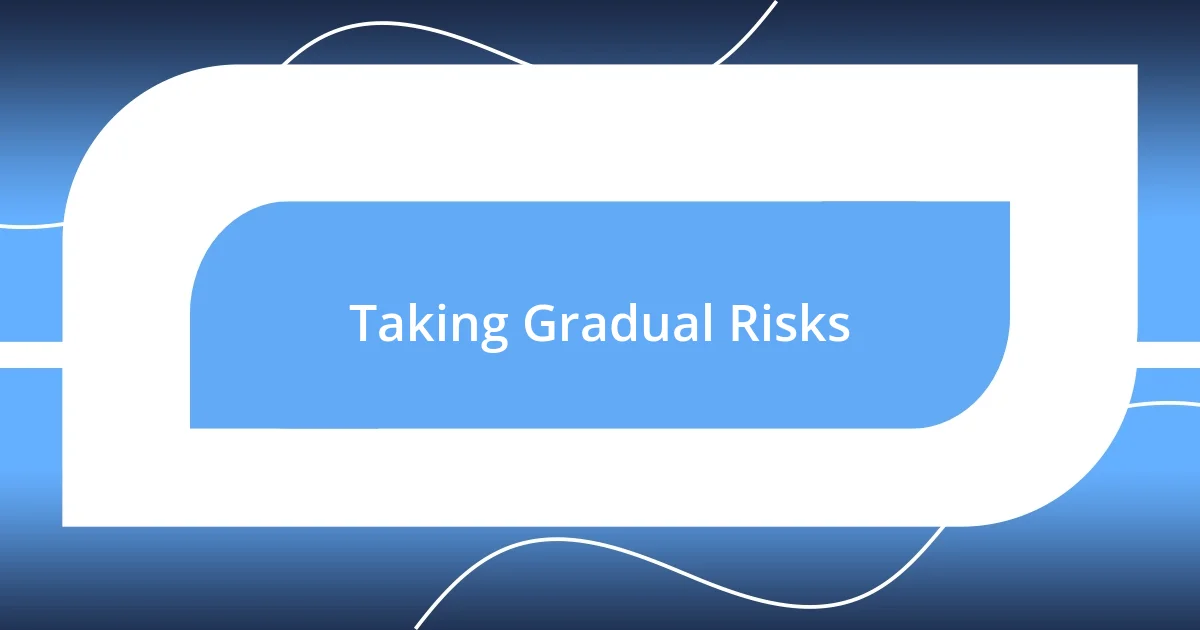
Taking Gradual Risks
Taking gradual risks has been a transformative experience for me. I recall the first time I decided to give a presentation at work. The thought seemed terrifying. Instead of jumping into the deep end with a full-length talk, I started with informal coffee chats where I shared my ideas with colleagues first. These small interactions helped me build my confidence and recognize that my contributions were valuable. Can you relate to starting small and growing from there?
I often think about how manageable risks can create a safety net for our growth. For instance, I hesitated to join a local book club because I feared being put on the spot. Instead of shying away, I took a small step and just attended without participating at first. Gradually, I started sharing my thoughts during discussions, and each time, I felt a weight lifted off my shoulders. It’s remarkable how these incremental moves can lead to breakthroughs. What small risk could you take today?
Gradual risks remind me that confidence isn’t something we magically acquire; it’s a skill we develop. One memorable day, I decided to try a cooking class, even though I had little experience. At first, I struggled, but I took it one dish at a time. Now, I whip up meals with a sense of accomplishment. There’s a certain thrill in handling challenges piece by piece. So, what’s something you’ve shied away from? Taking that first little risk might just be the start of something amazing.
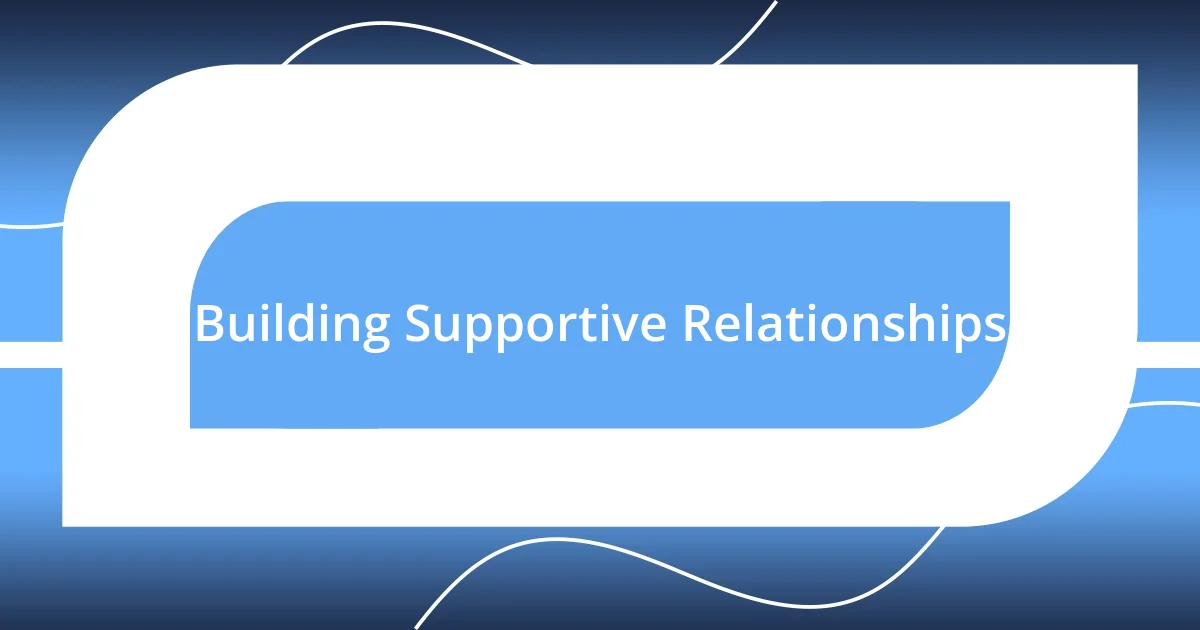
Building Supportive Relationships
Building strong, supportive relationships has been a game-changer for me in my confidence journey. I remember a time when I felt isolated and unsure of myself; it was during this phase that I reached out to a friend who always seemed to uplift me. Just sharing my thoughts and feelings with someone who genuinely listened made a world of difference. Have you ever experienced the power of a good conversation with someone who really understands you?
Over the years, I’ve learned the importance of surrounding myself with people who celebrate my victories, no matter how small. One day, after accomplishing a meaningful goal, I shared it with my family, expecting a simple acknowledgment. Their enthusiastic celebration filled me with joy and reinforced my belief that I had the power to achieve more. How often do we find support in our loved ones, and how does that spark joy and fuel further ambition in us?
Sometimes, it’s not just about the big moments; it’s also in the everyday interactions. I’ve noticed that joining interest-based groups, like a local hiking club, has helped me forge connections with like-minded individuals. The camaraderie built on shared experiences has allowed me to feel valued and understood. Have you thought about how the relationships you nurture shape your confidence? Strengthening those bonds can truly empower you to take on new challenges.
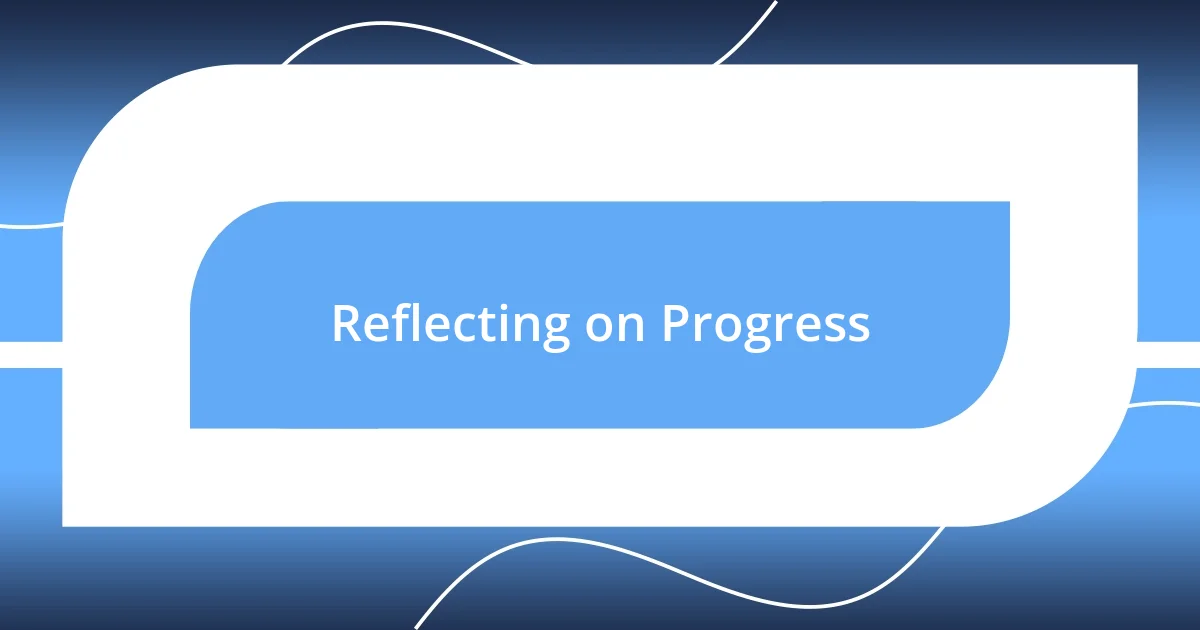
Reflecting on Progress
Reflecting on progress is one of the most rewarding aspects of building confidence. I remember when I finally took the time to look back at my journey after completing a challenging project. I was amazed how each small victory contributed to my overall growth. Have you ever paused to appreciate your achievements, no matter how insignificant they seemed at the time? It can be an eye-opening experience.
I find that journaling can be a powerful tool in this reflection process. There was a period when I documented my feelings and milestones daily, and the act of writing helped me see patterns in my growth. Those entries revealed moments of fear transforming into determination and how each setback was merely a stepping stone. How often do you take the time to write down your thoughts and insights? It’s incredible how much clarity can come from putting pen to paper.
Looking back at my progress also helps me anchor my beliefs in my abilities. Recently, I revisited an old goal I set years ago and realized how far I’ve come. The confidence I’ve built wasn’t instant; it’s been a gradual climb fueled by persistence. This reflection not only fuels my motivation but also reminds me that every step counts. What past challenges have you overcome that serve as a testament to your strength? Reflecting on these moments can inspire a new wave of confidence.














